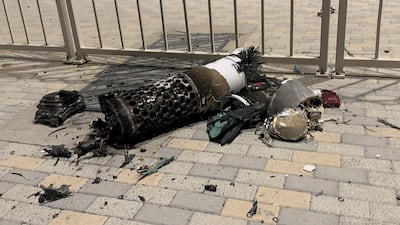Oil prices plummeted while Gulf stocks rallied with Asian equities after US President Donald Trump announced that Israel and Iran had agreed to a ceasefire.
Brent, the benchmark for about a third of global crude, fell 4.34 per cent to $68.38 a barrel at 5.56pm UAE time. The slide comes after it closed 7 per cent lower on Monday following Iran's attack on a US airbase in Qatar, a more restrained response than previously feared in retaliation against US strikes on its nuclear sites.
West Texas Intermediate, the gauge for US crude, fell about 4.42 per cent to $65.48 a barrel after losing more than 8 per cent in Monday’s trading.
"The geopolitical risks that have loomed over the Middle East for months have now fully materialised, prompting a rapid repricing in the oil market," said Janiv Shah, vice president, oil markets analysis at consultancy Rystad Energy.

US President Donald Trump said overnight in a social media post that Israel and Iran had agreed to a "complete and total ceasefire".
An official end to the 12-day war was soon to be followed, he said in a social media post.
Although Iran launched waves of missiles on Israeli targets after Mr Trump's announcement, the Israeli government agreed to the ceasefire on Tuesday after “achieving the objectives” of its attacks on Iran.
A statement from the office of Prime Minister Benjamin Netanyahu said Israel has now “removed a dual immediate existential threat – both in the nuclear and ballistic missile fields”.
Iran had said earlier that it would agree to stop attacking Israel only if it did the same. Iran's Foreign Minister Abbas Araghchi posted on X: “As Iran has repeatedly made clear: Israel launched war on Iran, not the other way around.”
However, Mr Trump again had to intervene and said the cease fire is holding after both Iran and Israel launched counter strikes.
"I don't like the fact that Israel went out this morning at all. And I'm going to see if I can stop it," he said before heading to a Nato meeting "Israel will not attack Iran," he said in a sperate social media post.
The war has threatened to disrupt energy supplies from the region and stoked fears of Iran closing the Strait of Hormuz, a vital water way for global crude flows.
The conflict has rattled global equities markets as well, adding to the already heightened volatility due to tariff concerns.
Stocks rally
Shares in Gulf equity markets rallied on Tuesday, led by the Dubai Financial Market. The DFM General Index surged 3.35 per cent, while benchmark gauge of the Abu Dhabi Securities Market advanced 2.48 per cent.
Saud Arabia's Tadawul, the biggest Arab bourse by market capitalisation, climbed 2.37 per cent. Main index of Doha Securities Market rallied 1.93 per cent, while main Market in Kuwait added 1.25 per cent.
Bourse in Bahrain rose 1.49 per cent, and main equities index in Oman added 0.38 per cent.
"A ceasefire between Israel and Iran ... improved market sentiment and helped investors regain their risk appetite," Osama Al Saifi, managing director for Mena at online trading platform Traze, said.
"Most markets erased the losses experienced during the last two weeks."
Shares in Asia also advanced, with Japan’s Nikkei index gaining 1.14 per cent and China’s Hang Seng rising 2.18 per cent. Stocks in Mumbai also gained 1.2 per cent.
Stocks in Europe also took a positive start, with FTSE 100 Index trading 0.4 per cent at 4:44pm UAE time, while equities in Germany and Paris adding 1.83 per cent and 1.21 per cent respectively.
Futures of S&P and Nasdaq also advanced 0.72 per cent and 0.98 per cent respectively.
S&P 500 on Monday closed 0.96 per cent higher, the Nasdaq Composite Index rose 0.94 per cent and the Dow Jones Industrial Average Index ended 0.89 per cent higher.
While the conflict in the Middle East is dominating headlines, sell-offs caused by geopolitical events tend to be brief, Bloomberg cited Morgan Stanley’s strategists led by Michael Wilson as saying in a note.
According to the Morgan Stanley team, prior geopolitical risk events have led to some volatility for equities in the short term, but one, three and 12 months after the events, the S&P 500 has been up 2 per cent, 3 per cent, and 9 per cent, on average, respectively.











